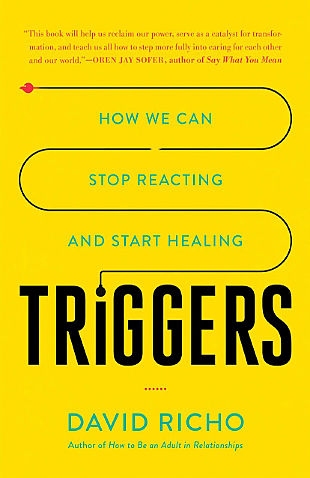In this immensely practical guidebook, David Richo, a psychotherapist, teacher, writer, and workshop leader, explains the importance of both negative and positive triggers. A trigger is "any word, person, event, or experience that touches off an immediate emotional reaction — for example, sadness, depression, anger, aggression, fear, panic, or humiliation, shame." A trigger can also be "a stimulus arousing joy, erotic excitement, or optimism" but in this book Richo is focusing mainly on negative reactions — the kind that bring us down and make us feel like we are living in a state of siege. Richo believes that when this happens, we can turn triggers into tools that enable us to inch toward our regular selves. He states:
"Inner resources are like aquifers nourishing us. They help us trust that what happens will not do what triggers can do: throw us for a loop, plunge us into despondency, turn us into targets, or make us collapse in fear and shame. Our best inner resource is our natural resourcefulness, our inventiveness and ingenuity in making the most of any hand we are dealt or in dodging any bullet headed in our direction."
Richo, as he's done in prior books, includes lists of psychological and spiritual tools that enable us to respond rather than react to triggers. The inner work he covers sheds more light on triggers. He includes material on the challenges of befriending the shadow, reducing our ego reactions, and working through our transferences.
We found the last sections of the book to be exhilarating as Richo examines the sadness trigger, the anger trigger, the fear trigger, and relationship triggers. The spiritual resources and practices he offers — such as assessing our inner goodness, and tonglen practice — we predict, will prove to be cathartic and healing for his readers. His ways of "Moving from Superstition to Reality" by reframing common superstitions of our time struck us as fresh and very helpful. For example:
"Everything will work out for the best.
We can change that to:
Everything will work out as it does and we will have the opportunity to look for the best in it or make the best of it.
"What goes around comes around.
We change that to:
May what goes around come around in a way that helps us all grow."
"There are no coincidences.
We can change that to:
There are ordinary coincidences based on randomness and there are meaningful coincidences in which the spiritual world breaks into our daily experience."
This is a tour de force resource for those seeking better ways to deal with triggers of all types.
